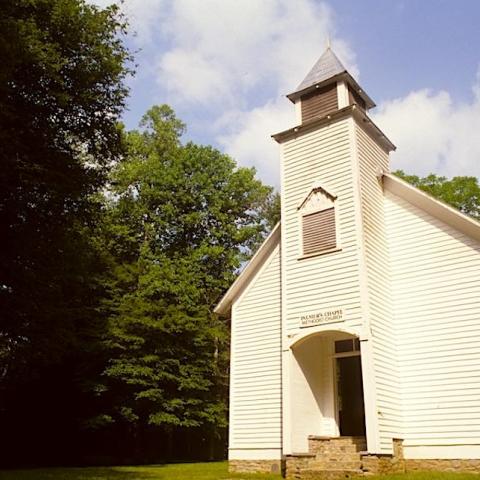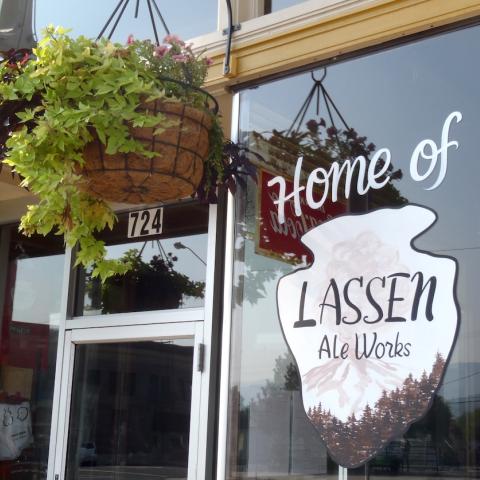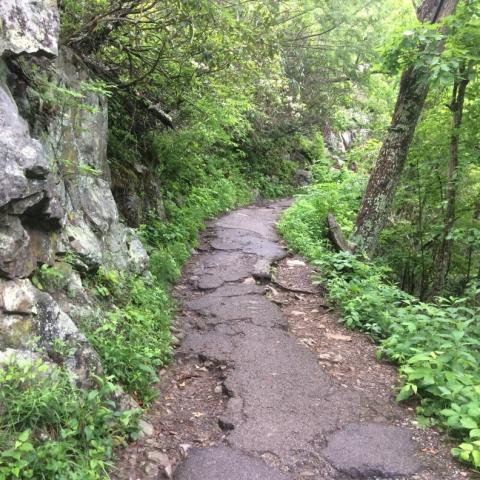
Can a 13-mile-long network of mountain bike trails really enhance your experience in Great Smoky Mountains National Park?/Harold Jerrell file
There is no need for 13 miles of mountain bike trails, with more asphalt and supporting infrastructure, to be cut into an undisturbed section of the Foothills Parkway at Great Smoky Mountains National Park.
At the end of the day, just how would the "experience of riding a narrow roller-coaster with a rhythm of twists and turns" enhance the visitor experience at this wondrous realm of nature? That question spins out of the park's scoping document concerning a "Wears Valley Mountain Bike Trail System." And it's not the only one.
Perhaps the only reason this proposal surfaced is because the area in question was eyed as a "transportation corridor" for the park back in 1944 when Congress told the National Park Service to acquire land on the Tennessee side of Great Smoky for a parkway "to provide an appropriate view of the Park from the Tennessee side of the park, and for other purposes…”
Land indeed was obtained for the envisioned Foothills Parkway, but not all of it was developed. Today, the portion known as Section D remains undeveloped, and its use as a mountain bike park is being considered by the park staff.
In advancing that proposal, the scoping document issued by the park the other day states that "(W)hile more than 800 miles of trails exist in the Park, less than 8 miles are open to biking and there are no by-design mountain biking trails."
However, according to the MTB Project, there are 70 miles of mountain bike routes in or next to the park. True, they might not be single-track miles (many if not all follow gravel roads), but do only single-track trails qualify as mountain bike trails? If so, the surrounding Pisgah, Nantahala, and Cherokee national forests have mountain bike trails.
The park's proposal begs the question of whether there is a need to build 13 miles of mountain bike trails in Great Smoky. Do mountain bike trails that offer riders an "experience of riding a narrow roller-coaster with a rhythm of twists and turns without worry of conflicts with other types of trail users" really improve the cyclist's national park experience? Or do they just give mountain bikers another venue?
Certainly, the proposed trails would make for a fun ride, but would they really improve the experience of visiting Great Smoky? Would the riders be oohing and ahhing at the surrounding parkscape and appreciating the human culture stitched into the park's mountains, hollows, and coves, or be riveted on the "narrow roller-coaster" in front of them so they don't miss a twist or turn?
Then there's the question of paving over the area for two parking lots with 50-80 parking stalls, a mile-long access road, restrooms, picnic area, possible concessions, etc. How large of a footprint would that make in addition to the impacts of building 13 miles of trail? Is that the best use of the landscape? How will that affect flora and fauna?
If this proposal moves forward and the trails and infrastructure are put in, should other parks that don't have mountain bike trails (Shenandoah, Saguaro, Grand Canyon, for example) but which have space, build trails?
Yellowstone National Park found space for a new parking area (which will be erased beginning this fall), so perhaps land in that park could be found for a mountain bike park. Would it enhance the park experience?
Acadia has carriage roads that mountain bikes can traverse, but they certainly don't provide that "experience of riding a narrow roller-coaster with a rhythm of twists and turns..." So should Acadia find room for that experience?
What about other forms of recreation? Tennis courts? Swimming pools? Skateboard parks? Should space be made available for them? Should parks pave trails parallel to roads for road bikes (Grand Teton has) so cyclists and vehicles don't collide?
Not to be overlooked is the cost of such an endeavor. As of FY18 (most recent figures available), Great Smoky's trail system had maintenance needs to the sum of $16.3 million, and of that $13.2 million were deemed "critical" deferred maintenance. With that in mind, is this project affordable?
It's certainly not a proposal without consequences, and not one that is needed.




 Support Essential Coverage of Essential Places
Support Essential Coverage of Essential Places







Comments
you wouldnt need to make new trails when horse trails aready exist...
how is riding a 1000lb shit machine more outdoors oriented?